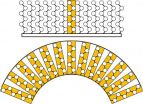(Press-News.org) DALLAS – Oct. 11, 2010 – The use of estrogen therapy by postmenopausal women might increase the risk of developing kidney stones, according to findings by UT Southwestern Medical Center researchers.
In a study available online and in today's issue of the Archives of Internal Medicine, investigators found that estrogen therapy after menopause increased a woman's chances of developing kidney stones by approximately 20 percent. This discovery calls into question the long-held belief that estrogen might actually protect women from the disease, and clinicians need to keep these results in mind when considering the risks and benefits of hormone therapy protocols in postmenopausal women, said Dr. Naim Maalouf, assistant professor of internal medicine at UT Southwestern and the paper's lead author.
Kidney stones (nephrolithiasis) in women are not uncommon, affecting an estimated 5 percent to 7 percent of postmenopausal women in the U.S., but are still less common than in men. Because women are less likely to develop the painful stones, some researchers have speculated that the estrogen might offer a protection that men don't have.
"This research suggests that the opposite might be true, and it offers new information that might be considered when prescribing estrogen-replacement therapies to postmenopausal women," said Dr. Maalouf, who is affiliated with the Charles and Jane Pak Center for Mineral Metabolism and Clinical Research at UT Southwestern. "Because the process of kidney-stone formation is influenced by a variety of lifestyle and other health-related factors, the true impact of estrogen therapy on the risk of nephrolithiasis is difficult to infer from observational studies."
Study results were drawn from trials conducted at 40 U.S. clinical centers. A total of 10,739 postmenopausal women who had had hysterectomies were randomized to receive an estrogen supplement or a placebo, and 16,608 postmenopausal women who hadn't had hysterectomies were randomized to receive estrogen plus progesterone (another female hormone) or placebo. The rate of nephrolithiasis was determined for an average follow-up of 7.1 years for the estrogen-only group, and 5.6 years for the second group.
In women receiving hormones, 335 cases of kidney stones were reported, while 284 cases occurred in the placebo groups. The baseline demographic characteristics and risk factors for kidney stones were similar in the two groups.
Development of kidney stones during the study was five times more common in women who had a history of kidney stones prior to the trial. Additionally, estrogen therapy increased the risk of kidney stone formation irrespective of age, ethnicity, body mass index, prior hormone therapy use or use of coffee or thiazide diuretics.
"Although these results indicate that estrogen therapy increases the risk of kidney stones in healthy postmenopausal women, the mechanisms underlying this higher propensity remain undetermined and mechanistic studies are needed to carefully explore this relationship," Dr. Maalouf said. "In view of the sizable prevalence of nephrolithiasis in postmenopausal women, these findings need to be considered in the decision-making process regarding postmenopausal estrogen use."
An acute kidney-stone event not only can cause physical suffering, Dr. Maalouf said, but also can progress to long-term complications such as renal failure.
"Treatment of nephrolithiasis also incurs substantial costs, estimated at $2 billion annually in the United States alone. Getting to the bottom of what causes kidney stones and how to prevent them is an important issue in women's health," he said.
Dr. Khashayar Sakhaee, chief of mineral metabolism and professor of internal medicine at UT Southwestern, participated in the research. Investigators from the MedStar Research Institute and Georgetown University School of Medicine; the University of Washington School of Nursing; the University of California, Davis; Baylor University Medical Center; and the Women's Health Initiative Clinical Coordinating Center at the Fred Hutchinson Cancer Research Center also contributed to the study.
INFORMATION:
The study was conducted as part of the Women's Health Initiative, a program funded by the National Institutes of Health.
Visit www.utsouthwestern.org/kidneys to learn more about UT Southwestern's clinical services for kidneys. Visit www.utsouthwestern.org/urology to learn more about clinical services in urology at UT Southwestern.
This news release is available on our World Wide Web home page at
http://www.utsouthwestern.edu/home/news/index.html
To automatically receive news releases from UT Southwestern via e-mail,
subscribe at www.utsouthwestern.edu/receivenews
Hormone therapy after menopause might increase risk of kidney stones
2010-10-13
ELSE PRESS RELEASES FROM THIS DATE:
Diabetes hospitalizations rise dramatically for young women
2010-10-13
ANN ARBOR, Mich. – A study published in Journal of Women's Health shows a rapid increase in the number of hospitalizations due to diabetes for young adults – particularly young women.
Diabetes hospitalizations were up by 66 percent for all ages and sexes, but the number of diabetes hospitalizations among younger adults, ages 30-39, more than doubled from 1993 to 2006.
This pattern of hospitalizations echoes the dramatic increase in rates of obesity across the United States in the last 30 years, according to the study by the University of Michigan Health System.
Young ...
Listen up: Ocean acidification poses little threat to whales' hearing
2010-10-13
Contrary to some previous, highly publicized, reports, ocean acidification is not likely to worsen the hearing of whales and other animals, according to a Woods Hole Oceanographic Institution (WHOI) scientist who studies sound propagation in the ocean.
Tim Duda, of WHOI's Applied Ocean Physics & Engineering Department, undertook a study in response to warnings that as the ocean becomes more acidic—due to elevated levels of atmospheric carbon dioxide (CO2)--noise from ships will be able to travel farther and possibly interfere with whales and other animals that rely on ...
Scientists pinpoint gene linked to drug resistance in malaria
2010-10-13
Scientists have shed light on how malaria is able to resist treatment with a leading drug.
Researchers have identified a gene that enables the parasite that causes the infection to resist treatment with the plant-based remedy artemisinin.
In many countries where the parasite has developed resistance to previously effective common treatments such as chloroquine, artemisinin remains the only effective treatment against the infection. However, malarial resistance to artemisinin appears to be developing, potentially creating problems in controlling malaria.
Identification ...
Lack of antiepileptic drugs hurts awareness, treatment efforts in Zambia
2010-10-13
EAST LANSING, Mich. — Despite an international effort to raise awareness about epilepsy in resource-poor nations, a recently published study found nearly 50 percent of pharmacies in Zambia do not carry antiepileptic drugs, seriously hampering efforts to tackle one of the most cost-effective chronic conditions to treat.
The study, recently published in the American Journal of Tropical Medicine and Hygiene, was led by Gretchen Birbeck, an associate professor of neurology and ophthalmology and director for the International Neurologic & Psychiatric Epidemiology Program in ...
Nanoscopic particles resist full encapsulation, Sandia simulations show
2010-10-13
ALBUQUERQUE, N.M.— It may seem obvious that dunking relatively spherical objects in a sauce — blueberries in melted chocolate, say — will result in an array of completely encapsulated berries.
Relying on that concept, fabricators of spherical nanoparticles have similarly dunked their wares in protective coatings in the belief such encapsulations would prevent clumping and unwanted chemical interactions with solvents.
Unfortunately, reactions in the nanoworld are not logical extensions of the macroworld, Sandia National Laboratories researchers Matthew Lane and Gary ...
Young people with mental health problems at risk of falling through 'gap' in care services
2010-10-13
Many young people with mental health problems are at risk of falling through a huge gap in provision when they move from adolescent to adult care services, according to new research from the University of Warwick.
A team led by Professor Swaran Singh at Warwick Medical School looked at the transition from child mental health services to adult mental health services and found for the vast majority of users the move was "poorly planned, poorly executed and poorly experienced".
In a study published in The British Journal of Psychiatry, the research team looked at 154 service ...
Successful kidney transplantation despite tissue incompatibility
2010-10-13
Donor kidneys can be successfully transplanted even if there is strong tissue incompatibility between donor and recipient. An interdisciplinary working group headed by Dr. Christian Morath, senior consultant at the Department of Nephrology at Heidelberg University Hospital (Medical Director: Professor Dr. Martin Zeier) and Professor Dr. Caner Süsal, head of antibody laboratory in the Department of Transplantation Immunology, showed in a study of 34 sensitized high-risk patients that the success rate in these patients was not different from the success rate of patients with ...
Large study shows females are equal to males in math skills
2010-10-13
MADISON — The mathematical skills of boys and girls, as well as men and women, are substantially equal, according to a new examination of existing studies in the current online edition of journal Psychological Bulletin.
One portion of the new study looked systematically at 242 articles that assessed the math skills of 1,286,350 people, says chief author Janet Hyde, a professor of psychology and women's studies at the University of Wisconsin-Madison.
These studies, all published in English between 1990 and 2007, looked at people from grade school to college and beyond. ...
Study supports the long-term benefits of transcranial magnetic stimulation for depression
2010-10-13
(CHICAGO)–In a study to determine the durability and long-term effects of transcranial magnetic stimulation (TMS), psychiatric researchers at Rush University Medical Center have found the non-invasive, non-drug therapy to be an effective, long-term treatment for major depression. Results of the study were published in the October 2010 issue of Brain Stimulation, a journal published by Elsevier.
TMS therapy is a non-invasive technique that delivers highly focused magnetic field pulses to a specific portion of the brain, the left prefrontal cortex, in order to stimulate ...
Adding cetuximab to chemotherapy doubles response rate in hard-to-treat breast cancer
2010-10-13
European researchers have proven for the first time that targeting the epidermal growth factor receptor can provide substantial clinical benefit for women with hard-to-treat triple-negative breast cancer.
At the 35th Congress of the European Society for Medical Oncology (ESMO) in Milan, Italy, the researchers presented results from a Phase-II randomized trial showing that adding the anti-EGFR antibody cetuximab to cisplatin chemotherapy doubled the response rate and time to progression when compared to cisplatin chemotherapy given alone in a study of 173 heavily pre-treated ...


